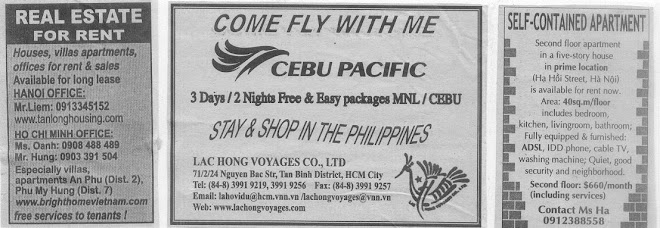I think the Key to Successful Real Estate is finding motivated sellers.
When I look for Real Estate, I look for
DON'T WANTER CONDITIONS.
These are conditions that create motivated sellers...(RT RGA)
D - Divorce
O - Obsolescence of property - needs major fix up
N - Negative cash flow
T - Transfer from job
W - Wrong management approach
A - Arrears in payments
N - Negative location
T - Taxes
E - Estate situations (death)
R - Retirement
C - Competition with neighboring properties
O - Out-of-area owners
N - Neurotic fears
D - Debts
I - Ignorance of investment principals and market conditions
T - Time constraints
I - Investment capital - needs capital for another investment
O - Ornery partner(s)
N - Need for status symbols
S - Sickness
These are the majority of the reasons for motivation and your goal is to find properties with sellers in these unfortunate situations. Using Win-Win Philosphy
You now become a problem solver as you attempt to solve these personal problems. Keeping in mind you are trying to offer a solution that will require little to no money down. The challenge is finding them.
There are several ways of finding good deals.
Here is some idea’s when it comes to finding deals, especially in markets like this one. Getting Good Deals In Any Market It is getting harder to find fixer properties.
Secondly, some markets are still hot . . . and some are cooling down. But fixers are still hard to find.
We are still at a point that many cash buyers have to settle for less than perfect properties. This puts upward price pressure on fixers and takes minor fix-up houses off the market. The home buyer will take on paint and paper level problems.
So secret number one in this market is . . .
Be willing to go beyond filthy houses. You will need to be willing to tackle some construction problems if you are going to find the profits you want. (Yes, deals will get better over the winter, but this is still good advice.)
To do this, you need two things:
Either you need to really know construction, or have a good property inspector you can count on. (I have been a general contractor, but I still hire an inspector now and then, and I always get a second opinion of someone in the trades.)
You will either have to hire a permanent construction person, which I have done, or develop a special relationship with one.
The third problem is here. Since real estate is hot, contractors and their subs are very busy. If you think you can get someone to show up THIS MONTH to do a small fix up job, forget it.
If they know how to use a hammer, they are working twelve hours a day now if they want.
The only other alternative is to know how to do it yourself. But that is about ten percent or less of the investors I know.
If you cannot solve those problems, you might consider just flipping (buy sell without holding) the fixers you find, and stay out of doing the repairs in the fixer market until you do. Cash is not really a problem now.
There are lots of investors to partner with. They will loan you money at high rates, or take a piece of the deal, or both.
The problem is finding the deals and getting the work done. Here are two examples to prove there are good deals still out there:
The first was a "For Sale By Owner". The owner is a contractor. It would seem a contractor would not be selling a fixer, but he lives 50 minutes away, and he has many houses under construction.
His subs figured $18,000 to fix the house. I figured $10,000 or less. He figured the value when completed at $173,000. I figured it at least $182,000. He said he would sell at $152,000 and he was firm. I got him to close at $149,000 plus some "give-me's".
Give-me's included six months of no-questions-asked financing at a very low interest rate, etc. Now that is what most people would say was the story. That is not the story. The story was that his sister had been living there for 16+ years.
He had been fighting with her over rent the entire time. She was behind. She would not pay. He would not fix. On and on. That was his motivation.
Unless and until you find the real motivation, you will be lacking the key tool to get the deal. We finished it, and the house down the street--which looks identical--is on the market for $95,000! It house recently been appraised for nearly $200,000.
The second deal was a cat infested house. You could smell the cat urine OUTSIDE the house!
That was the quickest inspection I ever did! The second time in the house I filled my nose with Vaseline or something before I went in!
It was listed for $170,000. The neighborhood was at $195,000. It was a pigpen. It would have to be gutted, dry walled, bleached etc.
My kind of deal, but I waited and made no offer at that time. It was listed, and the listing agent was a match with the owner. The owner offered for me to go around the agent at $99,000. My kind of people! I refused. But...
A month later the listing had a few days to expire, and I prepared a contract. I had $1,000. Ten brand new $100 bills. The contract called for a closing in 7 days. The proper day to present came and slam, we signed.
To be safe the contract was signed at an attorney's office. Later, someone might say she was off her rocker and did not understand what she was doing.
She was more than a little strange; the 15+ cats would be proof of that. But, she did know what she was doing. She had to quit work because of nerves.
The purchase price was $85,000. I liked that. But the real story was not the cats or the smell. That is why no one else would buy the place. That is not what is important. The reason she wanted to sell the place is because her money ran out.
Spending $20,000 for fixing the property, but sold it for $204,000. Not bad. The good deals are still out there, but if you want the big equities and big profits, you may need to roll up your sleeves.
As for myself, I have begun to start buying with the intent of holding two or three years. I may buy them in need of repairs, but in any case, I want to be positioned to wait out the economy for maximum profits.
If someone comes along and offers me too much, I just might take the cash.
Another method is a Short Sale. This is a situation where the homeowners have no equity.
The market has been softening, lenders have been very lenient on loaning to practically anyone and now we have properties going into foreclosure at an astounding rate as the market crashes.
A short sale is where you can negotiate the purchase price of the home for a fraction of the loan amount. It's a fantastic strategy especially in this market.
I will discuss more about this kind of market and foreclosures in a future article.
RT-RGA




